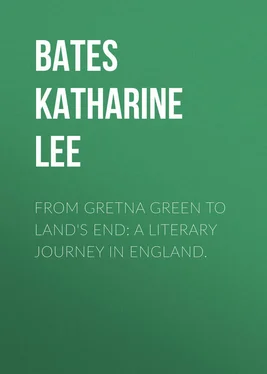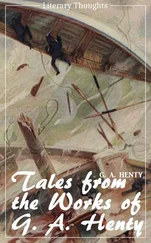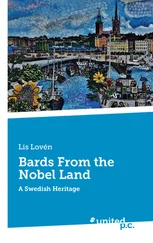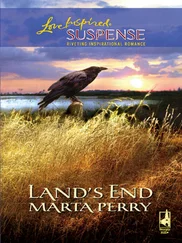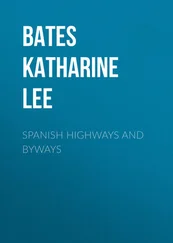Katharine Bates - From Gretna Green to Land's End - A Literary Journey in England.
Здесь есть возможность читать онлайн «Katharine Bates - From Gretna Green to Land's End - A Literary Journey in England.» — ознакомительный отрывок электронной книги совершенно бесплатно, а после прочтения отрывка купить полную версию. В некоторых случаях можно слушать аудио, скачать через торрент в формате fb2 и присутствует краткое содержание. Издательство: Иностранный паблик, Жанр: foreign_antique, foreign_prose, Путешествия и география, на английском языке. Описание произведения, (предисловие) а так же отзывы посетителей доступны на портале библиотеки ЛибКат.
- Название:From Gretna Green to Land's End: A Literary Journey in England.
- Автор:
- Издательство:Иностранный паблик
- Жанр:
- Год:неизвестен
- ISBN:нет данных
- Рейтинг книги:5 / 5. Голосов: 1
-
Избранное:Добавить в избранное
- Отзывы:
-
Ваша оценка:
- 100
- 1
- 2
- 3
- 4
- 5
From Gretna Green to Land's End: A Literary Journey in England.: краткое содержание, описание и аннотация
Предлагаем к чтению аннотацию, описание, краткое содержание или предисловие (зависит от того, что написал сам автор книги «From Gretna Green to Land's End: A Literary Journey in England.»). Если вы не нашли необходимую информацию о книге — напишите в комментариях, мы постараемся отыскать её.
From Gretna Green to Land's End: A Literary Journey in England. — читать онлайн ознакомительный отрывок
Ниже представлен текст книги, разбитый по страницам. Система сохранения места последней прочитанной страницы, позволяет с удобством читать онлайн бесплатно книгу «From Gretna Green to Land's End: A Literary Journey in England.», без необходимости каждый раз заново искать на чём Вы остановились. Поставьте закладку, и сможете в любой момент перейти на страницу, на которой закончили чтение.
Интервал:
Закладка:
The citizens of the cotton towns are proud of their grimy bit of the globe, and with good reason. "Rightly understood," said Disraeli, "Manchester is as great a human exploit as Athens." The swift industrial growth, the vast business expansion of all this region, are to be counted among the modern miracles of progress, barren of beauty and joy as their present stage may seem to be. The heroes held in memory here are plain workingmen whose mechanical inventions resulted in the English spinning-mill, – John Kay of Bury, James Hargreaves of Blackburn, Samuel Crompton of Bolton, and Sir Richard Arkwright, a native of Preston, who began his career as a barber's apprentice and won his accolade by an energy of genius which virtually created the cotton manufacture in Lancashire. The battle legends are of angry mobs and smashed machinery, of garrisoned mills and secret experiments and inventors in peril of their lives. The St. George of Lancashire is George Stephenson, the sturdy Scotchman, who in 1830 constructed that pioneer railway between Liverpool and Manchester, – a road which had to perform no mean exploit in crossing the quaking bog of Chat Moss. Fanny Kemble, when a girl of twenty-one, had the ecstasy of a trial trip with Stephenson himself. She tells with fairy-tale glamour how "his tame dragon flew panting along his iron pathway" at "its utmost speed, thirty-four miles an hour, swifter than a bird flies." Wonder of wonders, this "brave little she-dragon" could "run with equal facility backwards or forwards." This trip took place at the end of August, preliminary to the final opening on September fifteenth, an occasion whose triumph was marred by a fatal mischance, in that a stray dragon ran over a director who was innocently standing on the track. For a patron saint of to-day, Manchester need go no further than to the founder of the Ancoats Brotherhood, Charles Rowley, that cheery philanthropist reminding one of Hawthorne's friend who brightened the dreary visages he met "as if he had carried a sunbeam in his hand"; for the disciples of the Beautiful, the followers of the Golden Rule, are full of courage even here among what the poet Blake would designate as "dark Satanic mills." From out the dirt and din, shrieking engines, roaring furnaces, clattering machinery, chimneys belching smoke by day and flame by night, blithely rises the song of their Holy War:
"I will not cease from mental fight,
Nor shall my sword sleep in my hand,
Till we have built Jerusalem
In England's green and pleasant land."
But this, though the modern reality of South Lancashire, is not what the tourist goes out to see. From Liverpool to Furness Abbey is his natural and joyful route. He steams at full speed up this richest, most prosperous, and well-nigh most unattractive part of England; he has left the Mersey, the county's southern boundary, far behind; he crosses the Ribble, which flows through the centre of Lancashire, and the Lune, which enters it from Westmoreland on the north and soon empties into Morecambe Bay. He has come from a district close-set with factory towns, scarred with mine shafts and slag heaps, into the sweet quietude of an agricultural and pastoral region. But still above and beyond him is Furness, that northernmost section of Lancashire lying between Cumberland and Westmoreland and shut off from the rest of the county by Morecambe Bay and the treacherous Lancaster sands. High Furness is a part of the Lake Country, claiming for Lancashire not only Coniston Lake but even one side of Windermere, which lies on the Westmoreland border. Its Cumberland boundary is the sonneted Duddon. Low Furness, the peninsula at the south of this isolated strip, has a wealth of mineral deposits, especially iron. The town Barrow-in-Furness, which in 1846 consisted of a single hut, with one fishing-boat in the harbour, has been converted, by the development of the mines, into a place of much commercial consequence. Yet the lover of poetry will visit it, not for its steel works, figuring so tragically in Mrs. Humphry Ward's "Helbeck of Bannisdale," nor for its shipbuilding yards and boasted floating docks, nor for the paper works which take in a tree at one end and put it out as boxes of dainty stationery at the other, but in order to reach, by a boat from Peele Pier, Wordsworth's Peele Castle, "standing here sublime," – that old island fortress which the poet's dream has glorified with
"The light that never was on sea or land."
But it is to Furness Abbey that the throngs of sightseers come, and well they may. Its melancholy grace is one of the treasures of memory. It was thither that Wordsworth as a schoolboy – for Hawkshead is within the limits of Furness – would sometimes ride with his fellows. The "Prelude" holds the picture, as he saw it over a century ago, of
"the antique walls
Of that large abbey, where within the Vale
Of Nightshade, to St. Mary's honour built,
Stands yet a mouldering pile with fractured arch,
Belfry, and images, and living trees;
A holy scene! Along the smooth green turf
Our horses grazed. To more than inland peace
Left by the west wind sweeping overhead
From a tumultuous ocean, trees and towers
In that sequestered valley may be seen,
Both silent and both motionless alike;
Such the deep shelter that is there, and such
The safeguard for repose and quietness."
We lingered there for days, held by the brooding spell of that most lovely ruin. Hour upon hour we would wander about among the noble fragments which Nature was so tenderly comforting for the outrages of His Rapacity Henry VIII. Harebells shone blue from the top of the broken arch of the tall east window, whose glass was long since shattered and whose mullions were wrenched away. Grasses and all manner of little green weeds had climbed up to triforium and clerestory, where they ran lightly along the crumbling edges. Ivy tapestries were clinging to the ragged stone surfaces. Thickets of nightshade mantled the sunken tombs and altar steps. Ferns nodded over the fretted canopies of the richly wrought choir stalls and muffled the mouths of fierce old gargoyles, still grinning defiance at Time. In the blue overhead, which no roof shut from view, a seagull would occasionally flash by with the same strong flight that the eyes of the Vikings, whose barrows once dotted the low islands of this western coast, used to follow with sympathetic gaze. Wrens have built their nests in plundered niche and idle capital. The rooks, arraying themselves in sombre semicircle along some hollow chancel arch, cawed reminiscent vespers. And little boys and girls from Barrow, joyous mites of humanity not yet smelted into the industrial mass, tried leaping-matches from the stumps of mossy pillars and ran races through nave and cloister. The wooden clogs of these lively youngsters have left their marks on prostrate slab and effigy, even on "the stone abbot" and "the cross-legged knight," much to the displeasure of the custodian, – a man who so truly cares for his abbey, the legal property of the Duke of Devonshire, that he has purchased two of the chief antiquarian works upon Furness in order that he may thoroughly acquaint himself with its history. It was he who told us that many of the empty stone coffins had been carried away by the farmers of the neighbourhood to serve as horse-troughs, and that in their barn walls might be seen here and there sculptured blocks of red sandstone quite above the appreciation of calves and heifers. He told how he had shown "Professor Ruskin" about the ruins, and how, at Ruskin's request, Mrs. Severn had sent him from Brantwood seeds of the Italian toad-flax to be planted here. He lent us his well-thumbed folios, West's "Antiquities of Furness" and "Beck's Annales Furnessienses," so that, sitting under the holly-shade in the Abbey Hotel garden, with a "starry multitude of daisies" at our feet, we could pore at our ease over that strange story, a tale of greatness that is told, and now, save for those lofty ribs and arches so red against the verdure, nothing but a tale. Our readings would be pleasurably interrupted toward the close of the afternoon by the advent of tea, brought to us in the garden, and the simultaneous arrival of a self-invited robin.
Читать дальшеИнтервал:
Закладка:
Похожие книги на «From Gretna Green to Land's End: A Literary Journey in England.»
Представляем Вашему вниманию похожие книги на «From Gretna Green to Land's End: A Literary Journey in England.» списком для выбора. Мы отобрали схожую по названию и смыслу литературу в надежде предоставить читателям больше вариантов отыскать новые, интересные, ещё непрочитанные произведения.
Обсуждение, отзывы о книге «From Gretna Green to Land's End: A Literary Journey in England.» и просто собственные мнения читателей. Оставьте ваши комментарии, напишите, что Вы думаете о произведении, его смысле или главных героях. Укажите что конкретно понравилось, а что нет, и почему Вы так считаете.
